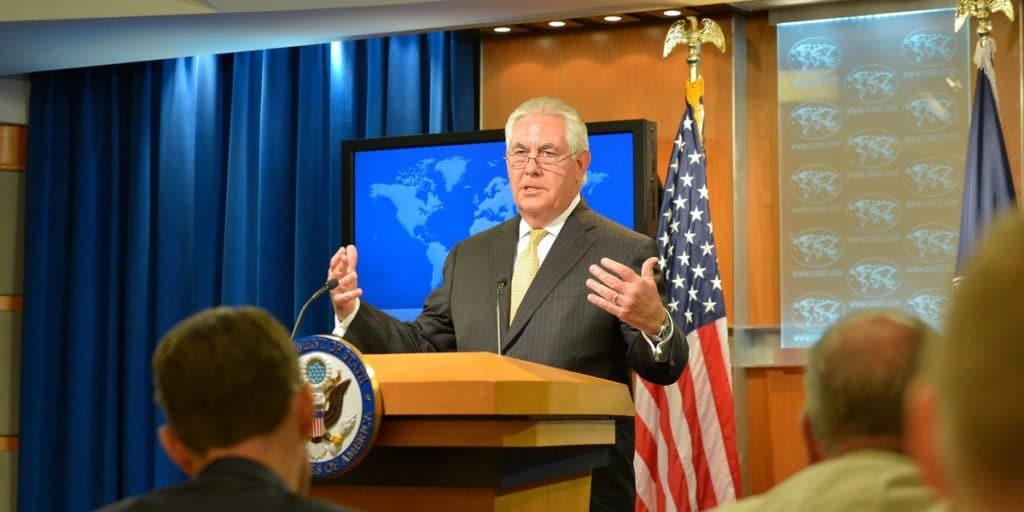On the eve of his first trip to South Asia as secretary of state, Rex W. Tillerson made an impassioned plea on Wednesday for closer ties with India while casting China as a threat to the world order and saying Pakistan needed to do more to fight terrorism.
The pro-India tone of his speech, at the Center for Strategic and International Studies in Washington, was clear when Tillerson began by wishing everyone a “Happy Diwali,” a reference to the fall Hindu festival of lights that is often marked by fireworks displays.
But he asked the audience to refrain from lighting any.
“I don’t need any fireworks,” he said to audible chuckles. “I’m getting too many fireworks around me already.”
Rumors about whether Tillerson has been considering leaving the Trump administration have surrounded him for months. His relationship with President Donald Trump is thought to be rocky, with Trump posting messages on Twitter that undercut Tillerson’s diplomatic efforts and Tillerson openly disagreeing with the president on important policy matters.
But top U.S. officials have been calling for closer ties with India for most of India’s seven decades as an independent nation, and little was new about Tillerson’s calls for improved military and economic relations between the two.
“The Trump administration is determined to dramatically deepen ways for the United States and India to further this partnership,” he said.
What was unusual, though, was that Tillerson felt the need to emphasize how much more the United States likes India than it does China and, to a lesser extent, Pakistan.
“China, while rising alongside India, has done so less responsibly, at times undermining the international, rules-based order even as countries like India operate within a framework that protects other nations’ sovereignty,” Tillerson said. “China’s provocative actions in the South China Sea directly challenge the international law and norms that the United States and India both stand for.”
He was less critical of Pakistan, but his spare remarks — only three sentences in a 20-minute speech — made clear that the country would not get the affection its neighbor received.
“We expect Pakistan to take decisive action against terrorist groups based within their own borders that threaten their own people and the broader region,” Tillerson said.
He could have complimented Pakistan for its help last week in freeing an American woman and her Canadian husband who had been held hostage for five years by militants in Afghanistan. That he did not suggested his visits with top Pakistani officials could be cold.
Tillerson is expected to visit New Delhi and Islamabad, Pakistan’s capital, next week.
As it has formulated its strategy for hot spots around the world, the Trump administration has emphasized that it looks at problems with a wider lens than its predecessors did — making decisions about troop levels in Afghanistan, for instance, dependent on a regional approach. So what goes up in India — meaning ties with the United States — seems to be headed down elsewhere.
Tillerson’s sharply critical remarks about China are the latest in what has been an almost bipolar attitude toward the country. Trump excoriated China during his campaign, but after assuming office, he expressed great respect for its president, Xi Jinping, saying that the United States was depending on China to rein in North Korea’s nuclear ambitions.
And even as Chinese leaders have made clear that they will not or cannot resolve the North Korean crisis, Trump has continued to treat Beijing gently, imposing none of the trade and currency sanctions he promised.
China experts have been predicting for months that mutual disappointment was inevitable. Tillerson’s speech suggested that moment may have arrived, at least at the State Department.
In a question-and-answer session after his speech, Tillerson even criticized the way China invested in its neighbors, saying infrastructure projects that it financed brought few local jobs and saddled countries with enormous debt.
Tillerson also briefly touched on the plight of the Rohingya in Myanmar.
“I think any of us that read this recent story in The New York Times, it just had to tear your heart out,” Tillerson said of reports of widespread atrocities being committed in Myanmar against the country’s Muslim ethnic minority. “If these reports are true, someone is going to be held to account for that.”
Myanmar’s government must allow improved access to the area for aid agencies, he said.
“The world just can’t stand idly by and be witness to the atrocities that are being reported in the area,” he said.
© 2017 New York Times
